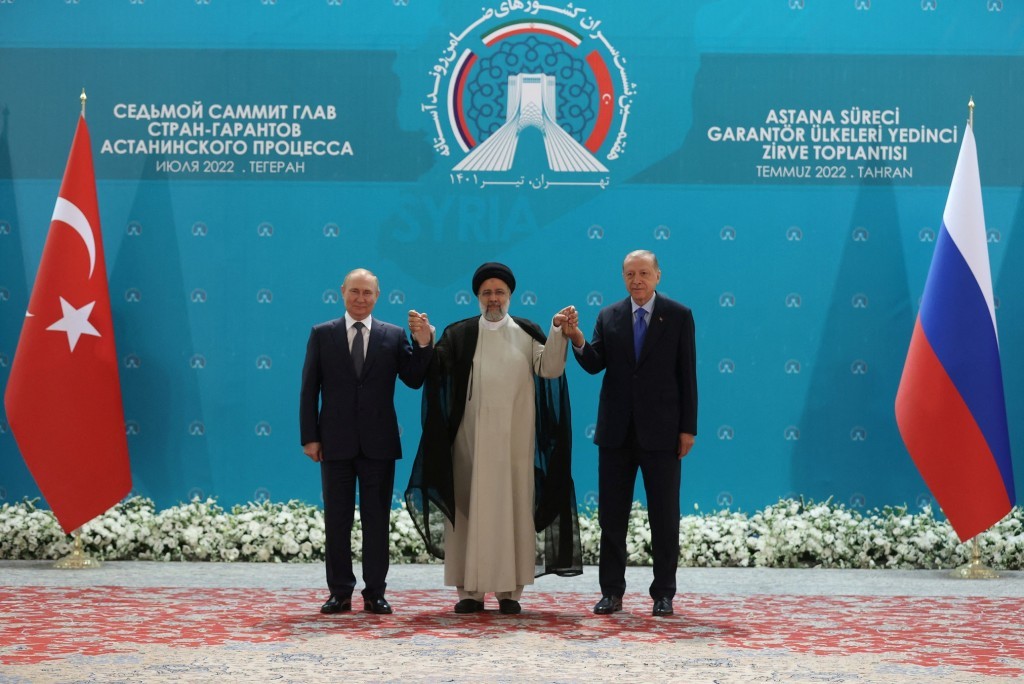- Articles
- Posted
The “Captagon” Act: The Contemporary Version of the “Caesar” Act... The Objective: Perpetuating Chaos and Acting Against Astana!
Before talking about the new sanctions law and its objectives, it is worth recalling that American sponsorship of the drug trade in South America, Afghanistan, and other parts of the world is proven not only by political facts, but also by the confessions of American officials. Perhaps the most prominent of these is the role of the CIA in the drug trade in Colombia, and financing itself and its dirty operations from that trade. Likewise, under the American occupation in particular, Afghanistan went from producing 5-10% of the global opium to producing 90% of it.
This introduction might be necessary to put aside the empty claims of the Americans and their followers, and to try to understand what the Americans really want from imposing such a law, at such timing.
On the 23rd of December 2022, US President, Joe Biden, signed into law the National Defense Authorization Act (NDAA) for Fiscal Year 2023, which is an annually-issued US federal law that specifies the annual budget and spendings of the US Department of Defense. Each year the NDAA includes articles and laws under different broad subtitles, not only linked to the Department of Defense, but also other agencies and departments like the Department of State, Department of Homeland Security, and intelligence agencies. The 2023 version of the NDAA included in section 1238 the so-called “Captagon Act”, under the name “Interagency strategy to disrupt and dismantle narcotics production and trafficking and affiliated networks linked to the regime of Bashar al-Assad in Syria”. This was under “Subtitle C – Matters Relating to Syria, Iraq, and Iran”. It is also worth noting, before talking about the details of this “law”, that the so-called “Caesar Act” was also part of the NDAA in its 2020 version.
What does the “Captagon Act” say?
The text of this law is not very long, so the parts we will note here includes nearly the entire law. In its beginning, the law lays out what it calls the “sense of Congress”, which says that “it is the sense of Congress that -- (1) the Captagon trade linked to the regime of Bashar al-Assad in Syria is a transnational security threat; and (2) the United States should develop and implement an interagency strategy to deny, degrade, and dismantle Assad-linked narcotics production and trafficking networks”.
The law stipulates the required strategy, which specifies that “not later than 180 days after the date of the enactment of this Act, the Secretary of State, in consultation with” other specified officials “shall provide a written strategy (with a classified annex, if necessary), to the appropriate congressional committees for disrupting and dismantling narcotics production and trafficking and affiliated networks linked to the regime of Bashar al-Assad in Syria”.
According to the law, the strategy must include the following six things:
(A) a detailed plan for (i) targeting, disrupting and degrading networks that directly and indirectly support the narcotics infrastructure of the Assad regime, particularly through diplomatic and intelligence support to law enforcement investigations; and (ii) building counter-narcotics capacity to partner countries through assistance and training to law enforcement services in countries (other than Syria) that are receiving or transiting large quantities of Captagon;
(B)(i) the identification of the countries that are receiving or transiting large shipments of Captagon; (ii) an assessment of the counter-narcotics capacity of such countries to interdict or disrupt the smuggling of Captagon; and (iii) an assessment of current United States assistance and training programs to build such capacity in such countries;
(C) the use of sanctions, including sanctions authorized under section the Caesar Syria Civilian Protection Act of 2019…, and associated actions to target individuals and entities directly or indirectly associated with the narcotics infrastructure of the Assad regime;
(D) the use of global diplomatic engagements associated with the economic pressure campaign against the Assad regime to target its narcotics infrastructure;
(E) leveraging multilateral institutions and cooperation with international partners to disrupt the narcotics infrastructure of the Assad regime; and
(F) mobilizing a public communications campaign to increase awareness of the extent of the connection of the Assad regime to the illicit narcotics trade.
A massive campaign pushing for the Act
US Congressman, French Hill, was one of the main contributors to drafting this Act. He has said that Captagon had reached Europe, and reaching the US is just a matter of time. He also said about the Act: “I am proud of this accomplishment and will continue to work tirelessly to prevent the Assad regime from furthering their influence and the international prevalence of Captagon”. In July 2022, Hill signed a letter addressed to the US Secretary of State, Anthony Blinken, regarding the necessity of including the “Captagon Act” in the NDAA, which had not happened in the 2022 NDAA. Hill said in the letter: “the Captagon trade is a cause of instability in the Middle East that has negative implications for the national security of the United States and its allies and partners”.
Hill had also expressed his disappointment when Syria was not included by the White House in a September 15th memorandum listing the major drug transit or illicit drug producing countries. The list included 22 countries, majority of which are in South America or the Caribbean, i.e., having a direct or at least being geographically proximate to the US. Some countries on the list were included previously, like Afghanistan, India, and Pakistan. Therefore, at least until mid-September 2022, it was not planned that Syria would be on the list or that this Act would be included in the NDAA, per the White House. Nevertheless, later, this Act was included in the NDAA, which was signed off by the US President.
Additionally, during the period when there was ongoing work on the law, there was a lot of focus on the issue in the media and by think tanks – Western, especially American, as well as Arab media and research centers, or at least they are “Arab” on their face, but their funding most likely would lead to an address in Washington. Although the Act appears to be simple and succinct, nevertheless, it certainly includes what is greater and goes further than what its words indicate, therefore, it was accompanied by a massive Western and Arab campaign.

The Act’s effects
As a start, and legally speaking, this Act is quite general and broad, and lacks real or clear legal standards. Thus, the means that could be used to implement are not limited, and can include everything and anything. Additionally, based on the Act in its current form, the Syrian state cannot be a partner in enforcing it, as the Act specifies the Syrian regime as the perpetrator and targeted entity. Therefore, the Act actually cannot be a means to stop Captagon production, but can theoretically only be a means to block exporting that production. This will have an opposite effect, as it will lead to increasing production to make up for losses resulting from possible confiscations.
This is nothing new when it comes to combatting trafficking of narcotics, but is a largely known and tested in many parts of the world: when production of narcotics is not terminated somewhere, trafficking thereof continues no matter the efforts put forth in monitoring and constricting that; to the contrary, when monitoring increases, so does production. This is all assuming that the Americans have real intentions to stop the production of Captagon, while reality and history both show that American authorities and intelligence agencies are the main partner in the majority of narcotics trafficking around the world.
Furthermore, this Act warrants greater US presence, primarily in neighboring countries (to Syria) which will cooperate with the US, and tighter US monitoring with regards to sanctions under the pretext of combatting narcotics. Pursuant to the Act, the US can impose any sanctions it deems necessary to target narcotics production, and there are no criteria that prevent the US from imposing such sanctions on Syria or another country. There are also no clear criteria on what a pretext for such sanctions can be, since the targeting can be direct or indirect. In other words, this Act does not aim to improve the situation in Syria or putting an end to production, spread, and use of narcotics, but merely serves as an additional pretext to tighten the siege on Syria and limiting further the materials that can go in and which are not covered by the existing sanctions. The Act also serves to increase monitoring of neighboring countries to prevent them from being an option to break the suffocating siege imposed on Syria and Syrians.
The timing!
It is necessary to recall that “Caesar” is the symbolic name for the broadest sanctions law imposed on Syria, which also had the name and slogan of “protection of civilians”. Reminding of this is necessary, because sanctions were not and will not have any real connection with protecting civilians. Quite the contrary, sanctions have proven to be a political-economic tool, through which Syrians’ suffering has been deepened, without actually affecting the Syrian regime, as was alleged. In reality, the sanctions opened many doors before the war lords and extremists on all sides to perpetuate their influence on people by expanding the black and criminal market to the extreme, until it became the main market. That is, the Caesar Act has tangibly contributed not only in destroying any productive economy in Syria, but also in perpetuating a mafia-like economic cycles in the different parts of Syria.
Now, with the “Captagon Act”, in essence things are the same. Before too long, it will become clear to everyone that combatting Captagon trafficking is nothing more than a fictitious slogan, just the same as “protecting civilians” of the Caesar Act, while the real goal is to broaden the tools of American control not only in Syria, but also particularly in neighboring countries, especially in Jordan and Iraq. Through this, the US will try through this Act and other tools to cancel the effects of the work of the Astana tripartite, which have started talking openly or nearly openly that they there are proceeding not only with the Syrian-Turkish settlement, but also towards implementing 2254 and resolving the Syrian crisis without the US’ participation, and if needed, despite the US.
Added to that is the Captagon Act can be used as was the Caesar Act before it, i.e., as a tool within the so-called “step for step” project. That is, this Act can be used as an additional tool in the process of extortion and negotiation for the purpose of controlling the proportionality of forces inside Syria and in its perimeter. This is in hope of achieving two things: the first is extending the attrition as long as possible, through which not only will there be attrition and sabotage of Syria alone, but an organized attrition process of all the region’s countries for the benefit of the “Israeli” entity. Additionally, the aim is to also achieve attrition of the two main international opponents: Russia and China, and at a minimum through preventing completion of their strategic project: the Belt & Road and the Eurasian. These two projects cannot be completed as long as our region – which includes Syria, Lebanon, Iraq, Turkey, and Iran, along with Egypt and Saudi Arabia – remains in a state of tension, attrition, and conflicts. The eruption and continuity of the crisis in Syria has become a main foundation for devastation in this entire region, and perhaps more dangerous than that for the Americans, is that resolving the Syrian crisis in particular, and because it has become an intersection point for all the ongoing conflicts in the region, would provide a key to resolving a number of regional crises, in which the Americans have invested for decades.



